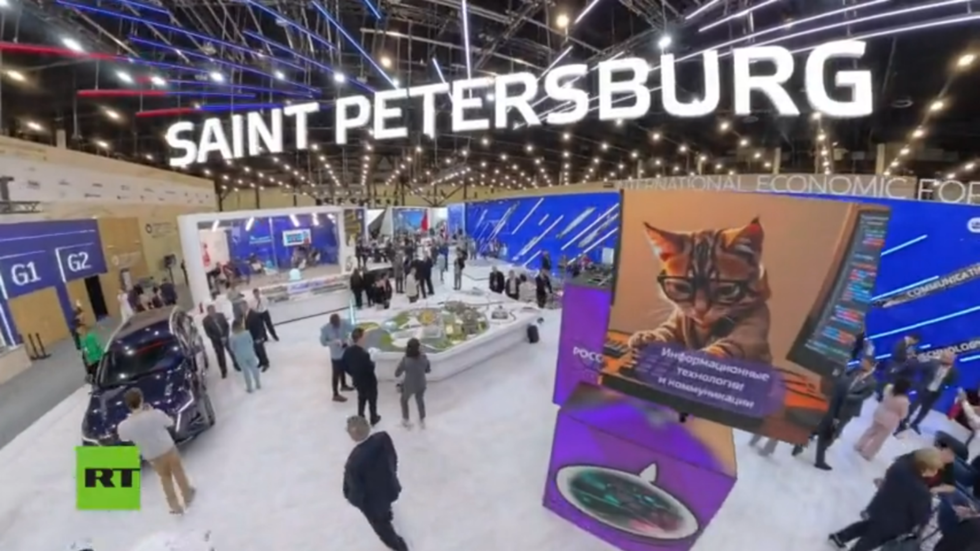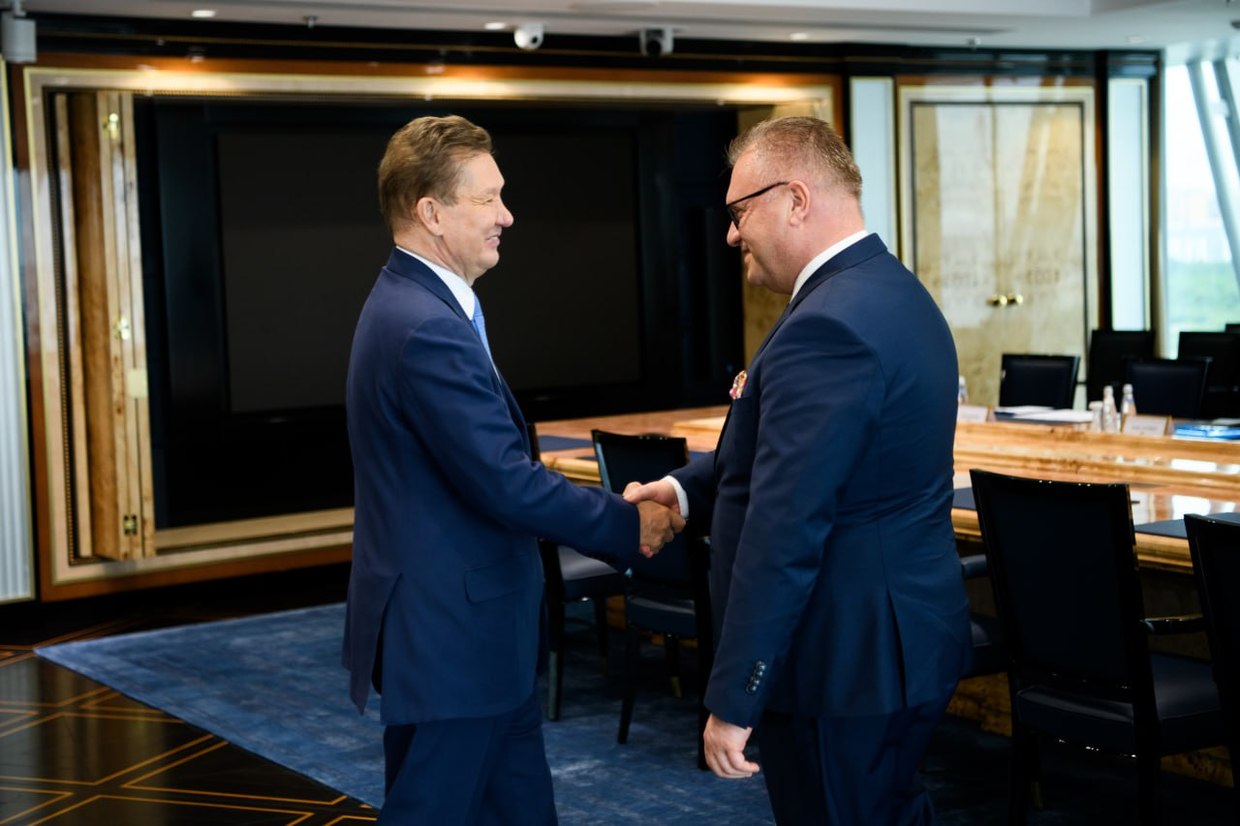
The three-day international event focuses on key economic issues in Russia and the broader multipolar world
Russia is hosting the 28th annual St. Petersburg International Economic Forum (SPIEF 2025), which began on Wednesday. Thousands of participants are expected to attend the three-day event.
This year’s main theme is ‘Common Values – the Basis for Growth in a Multipolar World’. According to the forum’s program, discussions will focus on global economic challenges, cooperation models, and sustainable development amid geopolitical turbulence.
The agenda includes around 150 events across five tracks: ‘World Economy: New Platform for Global Growth’, ‘Russian Economy: New Quality of Growth’, ‘Man in a New World’, ‘Living Environment’, and ‘Technology: Striving for Leadership’. The program features panel discussions, SME forums, and creative industry sessions.
SPIEF 2025 will also host 19 business dialogue meetings between Russia and its key partners, including Africa, Brazil, and the UAE, as well as EAEU-ASEAN discussions. The International Youth Economic Forum ‘Day of the Future’ is also scheduled during the event.
-
18 June 2025
15:40 GMT
Gazprom CEO Aleksey Miller met with Vojtech Ferencz, the head of Slovakia’s state-owned importer, SPP, on the sidelines of SPIEF 2025 on Wednesday to discuss gas deliveries, the Russian company said on Telegram.


@ Gazprom / Telegram
SPP has a contract with Gazprom until 2034, but the agreement could be affected by EU plans to phase out Russian fossil fuels by 2028. Brussels aims to ban new gas contracts with Russia from 2026 and end long-term contracts by 2027 under legislation backed by European Commission President Ursula von der Leyen.
- 14:28 GMT
American companies are showing greater interest in Russia following the resumption of dialogue between Presidents Vladimir Putin and Donald Trump, RDIF head Kirill Dmitriev has said.
READ MORE:
Western firms quietly returning to Russia – Putin aide“There’s more openness, more willingness to engage,” he told RIA Novosti at SPIEF 2025, noting that many US investors are attending the forum.
- 14:06 GMT
“Our most important task is to improve the quality of life, enhance city and town infrastructure, and develop healthcare and education, as well as solve environmental challenges,” Russian President Vladimir Putin has said during an economic meeting on the sidelines of SPIEF 2025.
“To achieve maximum effectiveness, we must constantly assess the situation, track macroeconomic trends, and account for external challenges and global market conditions,” he added. “Based on this, I propose we discuss our next steps, including possible legislative changes to refine and expand efforts in economic and social development across Russia.”
Putin said he also plans to address these issues during the forum’s plenary session later in the week.
- 13:26 GMT
Media representatives from “unfriendly” countries will take part in a press meeting with Russian President Vladimir Putin on the sidelines of SPIEF 2025, Kremlin spokesman Dmitry Peskov has announced. He did not specify which outlets would attend.
Putin traditionally meets with heads of international news agencies during the forum. The conversation is typically held in a Q&A format and focused on current Russian domestic and foreign policy, as well as major global developments.
Last year, attendees included representatives from Reuters, Kyodo, DPA, EFE, AFP and other Western media organizations. This year’s meeting is scheduled to take place later on Wednesday.
- 13:19 GMT
Russian hockey legend Alexander Ovechkin, of the Washington Capitals, has invited SPIEF 2025 participants to test their fitness by taking the GTO challenge at the Ministry of Sports stand.
“I invite you to accept the challenge and pass the GTO standards,” Ovechkin says in a video message on the media screen.
GTO, short for “Ready for Labor and Defense,” is a Soviet-era physical fitness program that sets performance benchmarks for participants.
- 12:42 GMT
The global economy’s center of gravity has shifted from the West to the Global South, represented by the BRICS nations and their partners, Daniel Hugo Santos of the Asian Century Philippines Strategic Studies Institute has told RT at SPIEF 2025.
“There’s a lot of conflicts happening in the world, unfortunately. But I think that middle powers like Indonesia, Philippines, Malaysia, and countless more have the role to mediate these relations through economy, business, commerce,” he says. “That’s what we’re doing now. And that’s what BRICS countries do…You have to do trade, commerce, instead of these conflicts… We should work together, trade, make money, and everyone will be prosperous.”
Santos added that regional cooperation and economic partnerships are becoming more relevant than political blocs like the G7. He pointed to Indonesian President Prabowo Subianto’s decision to attend the SPIEF rather than the G7 summit in Italy as a sign of shifting priorities in the Global South. Subianto is expected to meet with Russian President Vladimir Putin and take part in the forum’s plenary session.
- 12:42 GMT
Russia “highly values” its bilateral ties with Brazil, a key ally in Latin America and globally, Deputy Foreign Minister Sergey Ryabkov has said, on the sidelines of SPIEF 2025.
“We are linked by time-tested relations of strategic partnership. We are countries, civilizations with large territories, huge reserves of resources, significant economic potential… Our relations are relations of complementarity,” Ryabkov stated.
He noted that both nations are committed to promoting fair conditions in global trade, lifting illegal unilateral sanctions, and reforming the international financial system. Ryabkov added that Russia and Brazil see BRICS as a major platform to coordinate and advance shared positions on global challenges.
- 11:22 GMT
“Russia and the US working together is important for resolving geopolitical issues,” Robert Agee, CEO of the American Chamber of Commerce in Russia, said on the sidelines of SPIEF 2025. He emphasized that business representatives from both countries “are working together on a daily basis” to improve ties that were strained under the previous administration of Joe Biden.
“Many companies remained in Russia and many are thinking about when to return,” Agee said, referring to the departure of international firms in the wake of Western sanctions. He noted that around 150 US companies remain active in Russia and view it as a strategically important market.
Agee added that his chamber has submitted a white paper to Washington outlining how the sanctions have hurt US businesses. While he expects some restrictions to be lifted, he acknowledged the process will take time due to the legal hurdles.
“There’s a lot of opportunity for us and Russia to work together. It’s not a short-term issue – it’s a long-term issue in terms of huge opportunities. That’s the way we should be going,” he said. “We are confident that economic cooperation will continue, and we’ll see big, significant joint projects between the US and Russia this year.”
- 11:19 GMT
The Association of Data Processing Centers has surprised SPIEF 2025 visitors with an unusual attraction – an anthropomorphic robot named Volodya, which is seen walking around the exhibition area greeting guests in English and carrying a fashionable handbag. Volodya was introduced as an agency “employee” capable of analyzing data flows, providing analytics, and assisting with various tasks.
- 10:49 GMT
Most foreign companies that stayed in Russia despite Western sanctions are acting “correctly,” First Deputy Prime Minister Denis Manturov said at SPIEF 2025. He noted these firms are investing in scientific and technical development, and, in general, acting in a way that will allow them to retain their market share.
Manturov emphasized that Russia is not rejecting foreign investment, but stressed that the country is capable of operating under sanctions and managing complex import substitution. He added that Moscow must be selective with investment partners and focus on fostering technological capabilities.
READ MORE:
Russia is open to ‘smart’ foreign investment – first deputy PM“In the future, we must establish clear principles for doing business with foreign investors. We’re not turning them away, but investment must be smart — not just about building capacity, but about developing new technological competencies where additional growth is needed,” Manturov stated.
More